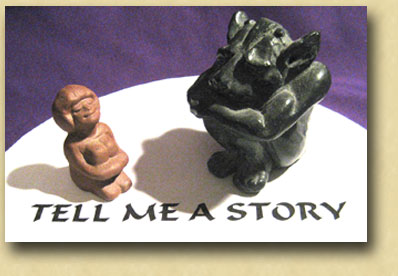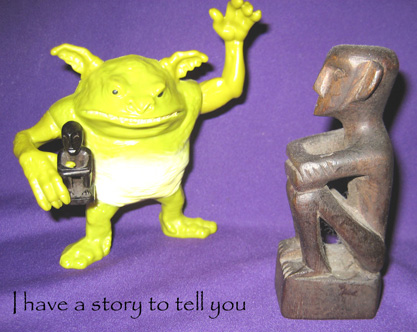


Storytelling is Magic
"From the earliest of times, one factor
that has always set us apart as humans is our need to share stories that
impart valuable lessons." Those words sum up the question as to what
good storytelling might be.
Cavemen sat around the fire recounting heroic tales of hunting or
rather, they mimed or acted out the day's hunt, to teach their children
basic survival skills. The ancient Greeks shared stories so compelling
and focused on timeless human conditions that they remain popular today.
Every civilization has come to depend on the storytellers to carry out
their oral history and have been valuable and cherished parts of those
societies
Stories are a part of our daily lives as our entertainment, news and
effective learning tools. As a teacher I have always been struck by the
power of storytelling, well done, to create, change or inspire the
listener. Sharing those tales of wonder, sadness, lament, enlightenment,
and mystery are the core of communication, inspiring, reinforcing
principles or stirring new plans of action. A carefully chosen story can
help develop hope and understanding, encouragement, and self esteem
where simply reading such material can bog down the listener and prevent
them from focusing on the message.
Storytelling comes naturally to some but not to others. Considering some
of the aspects of the process it can become a skill. On a daily basis,
we offer recaps of the weekends or share a movie plot. What isn't
natural-and actually takes some practice--is telling your stories to
others and to move them to action or emotional experiences.
Kendall Haven, the author of "Super Simple Storytelling," narrows the
secret of good storytelling down to three basic concepts.
First, he notes that each person has his or her particular way of
speaking and possesses certain oral presentation traits. Haven believes
that storytelling should draw from that person's strengths as a speaker.
Basic courses in public speaking are available in many adult education
courses offered by the public schools or junior colleges in many areas.
In addition some basic acting classes are also at our disposal and are
encouraged.
Second, not all parts of the story are equally valuable. He advises us
to be aware of which parts of the story have the most value for the
particular audience, and not to worry so much about the other aspects of
the story. Don't be in a hurry however, to do whatever bit of magic you
have chosen to illustrate the climax of the story. Punx is quoted as
saying that the story could and probably should e able to stand alone
without doing any magic.
Finally, Haven notes that stories happen inside the listener's head so
we must be aware of what the listener really needs from the telling of
the story.
The focus needs to be on the oral aspect of storytelling. Inflection and
/or emphasis on a word or a phrase must be scripted into your story as
you are preparing the material. A shout or a whisper or a soft,
whimpering sigh, are important oral tools. Though you may be telling the
story only one time, the real lesson in storytelling comes when your
listener recounts it to others. Hone your acting skills as well as
learning the stories you will tell.
Whether is a fairy tale, folklore, an anecdote from a friend, or an
internet story you have read, there will need to be three elements in
any story: characters, narrative and revelation.
Characters need to be relatable to your audience. A familiar name or
something from current events are a couple of examples, but are not the
criteria for basic storytelling.
The narrative should walk the listener through a situation recognizable
to him or her. To be sure there needs to be an element of surprise, if
possible, which can make the story more memorable. Having to explain
settings or other details can and often do interfere with getting the
audience to engage with the narrative. Verbosity is not a good
substitute for misdirection.
The revelation, finally, is the take-away point you want to leave with
your listener. Here is your spot to do your little bit of magic. After
the effect is done you need to take your bow and get off the stage or
platform.
The other aspect of storytelling to keep in mind is that stories should
be inherently entertaining and captivating. Ever since those cavemen
gathered around that fire, we have wanted to hear the gory details and
learn about their exploits. That is what builds camaraderie and
satisfies the innate curiosity about how we live. Make your stories
relevant, but simple. Gauge the response from this premise. How much is
enough and how much is too much. The impact of stories on attitudes,
influence and knowledge is the key to good storytelling but be careful
not to bore your audience.
Stories
Available now as e-books
Click on a title to view the cover art and table of contents.
To purchase an e-book for $25, go to the "For Sale" page.
|
THE BACKDOOR KEY OF SOLOMON MAGIC BY THE SEAT OF YOUR PANTS
|
|
|
What people in the
Magic field are saying
Read what someone in the field says about DeNomolos's stories.
Published works & Awards
A list of works & awards from 1958 to 2008



COPYRIGHT 2010 AND BEYOND
